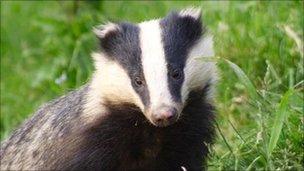National Trust estate giving badgers TB vaccinations
- Published

The National Trust said vaccinating badgers was a "practical step forward"
Badgers in a bovine tuberculosis "hotspot" on a National Trust estate in Devon are to be vaccinated as part of a four-year scheme, the trust says.
The scheme, which is to cost the trust £80,000 a year, will take place on the 6,400-acre Killerton estate in Exeter.
It aims to see if vaccination can be a viable alternative to culling badgers, which spread TB to cattle.
The work, which starts in May, will see government experts catch the animals, inject them and then catalogue them.
Vaccination 'most effective'
The trust said vaccinating badgers was a "practical step forward" after recent field studies which showed it worked to reduce TB in the wild animals.
Almost 35,000 cattle were slaughtered last year as part of efforts to control bovine TB, which is a particular problem in areas including Wales and the South West of England.
Six months ago the government revealed plans to allow farmers to cull badgers as part of a series of "science-led" measures to deal with TB.
However, a bid to introduce a cull in Wales has been held up by legal action and the final go-ahead in England has also been delayed.
Eighteen tenant farmers will participate in the trust's programme. It will cover an area of almost 5,000 acres of farmland on the estate.
Staff from the Food and Environment Research Agency will catch, inject the mark caught animals to ensure they do not get re-injected.
Injecting the vaccine is currently the only way to administer it, although research and development of an oral vaccine which can be fed in bait to the animals is ongoing.
Mark Harold, director of the trust in the South West, said: "In many areas of the UK there are clearly practical problems in implementing an effective cull on badgers to reduce bovine TB in cattle.
"In these instances, vaccinations of badgers would appear to be the most effective ways of controlling the wildlife reservoir of the disease.
"This programme will show how badger vaccination can be deployed over a large area, and will pave the way for more widespread use of vaccination as an effective alternative to culling."
- Published1 December 2010
- Published24 June 2010